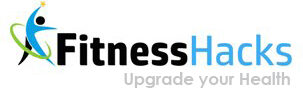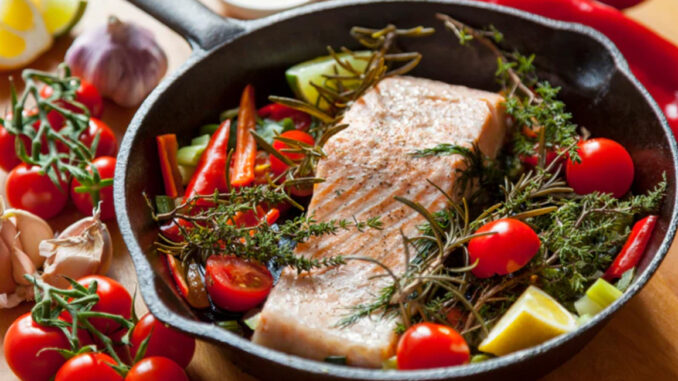
Diet trends keep changing over time with new ones popping up and claiming to offer even faster weight loss. While fad diets may work short-term, they are rarely sustainable in the long run.
High protein, low carb diets have stood the test of time and rank high among the most effective ways to lose weight quickly.
What is the High Protein, Low Carb Diet?
Low-carb diets are the best way to encourage your body to burn fat. Adequate protein intake during this time prevents muscle loss during weight loss. Protein also keeps you feeling full for longer and prevents food cravings.
While keto diets restrict you to 20-50 grams of carbs a day, you can eat a lot more on a low-carb diet. For example, a person weighing about 150 pounds, on a 2000-calorie diet, can have 130-150 grams of carbs. On a low-carb diet, less than 26% of your total calorie intake should be from carbs (1).
Just make sure these are in the form of complex carbs and fibrous veggies rather than simple sugars and refined flour. Legumes and whole grains can also be included in moderate quantities. They also keep you satiated with fewer calories. This enables you to get more fiber and nutrients into your diet and have more balanced nutrition.
How High Protein Low-Carb Diets Cause Rapid Weight Loss
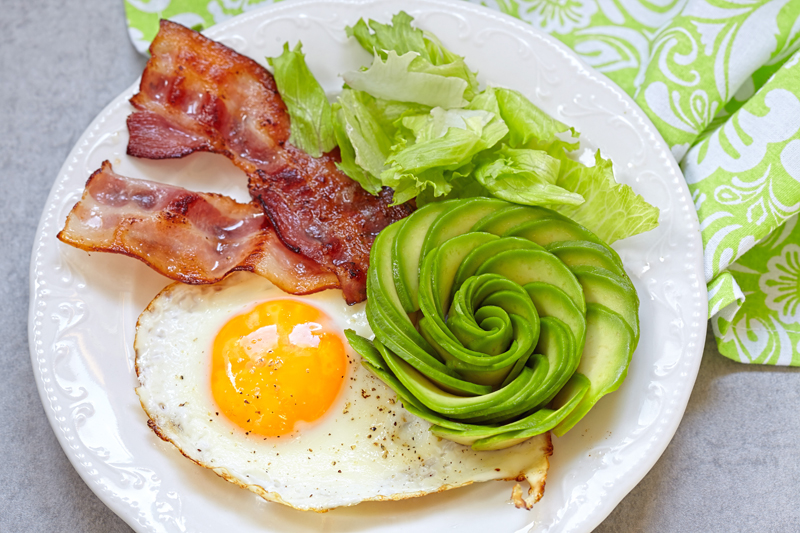
There are 3 key factors that encourage weight loss in low-carb high protein diets.
- Stop storing fat: Regulating your carb intake helps overcome leptin resistance. This reduces fat absorption and discourages your body from storing more fat.
- Push the stored fat out: The high-carb intake protects muscles while suppressing hunger and you are able to stick to a low-carb diet plan. The resulting calorie deficit and depletion of glycogen stores mobilize stored fat for energy.
- Burn the excess fat: The metabolism boost from high protein intake and carb cycling promotes fat burning.
There are 6 underlying mechanisms that enable low-carb high protein diets to achieve these goals to trigger rapid weight loss.
1. Overcoming leptin resistance
Leptin is a hormone secreted by our fat cells. It is known as the starvation hormone as leptin signals your brain that you are approaching starvation and need to store as much fat as possible for the approaching famine. The brain ramps up your hunger to ensure you eat as much as possible.
On the other hand, leptin also tells your brain that there are enough fat stores, so please stop storing and start burning the fat instead. This curbs your appetite and you no longer feel hungry. Thus leptin has a powerful impact on your hunger and food intake as well as your fat-burning and metabolism (2).
But most people attempting to lose weight have too much leptin. But their brains are unable to acknowledge the leptin signals and the body continues to hoard fat while attacking you with food cravings and hunger pangs. This condition is known as leptin resistance. So to lose weight, we need to overcome leptin resistance. Regulating your carb intake plays a vital role in improving leptin sensitivity.
2. Lowering carbs to block fat storage
Our bodies rely on burning glucose for their energy needs. Only in the absence of glucose, stored body fat gets burned up. To block fat storage, we need to not only lower our carb intake but also keep a careful watch on the type of carbs we eat.
We need to choose carbs that take time to break down and get absorbed. So make sure to choose low-glycemic foods such as brown rice and whole-grain bread. Choose fibrous vegetables instead of the more starchy ones.
3. Emptying glycogen reserves to promote fat burning
The body stores carbs in the form of glycogen, especially in the muscles. To switch the body over to a fat-burning machine, we need to use up our glycogen reserves as well.
So in the initial phase of a low-carb high protein diet, you need to go as low as possible on the carbs, to jump-start the weight loss. Considering that each gram of glycogen holds 3 grams of water, you will lose a lot of water weight in the beginning (3).
4. Mobilizing fat reserves and regulating fat intake
When the body turns to burn fat for fuel, it first uses up the fat in your diet before turning to stored body fat. So regulate your fat intake accordingly and select healthy fat sources. Use a teaspoon or two of butter or coconut oil to saute your veggies. You can have whole eggs with yolk and dips such as guacamole.
For weight loss to occur, you need to create a calorie deficit and the low-carb intake helps achieve that goal as long as you don’t overshoot your protein and fat intake.
5. Boosting metabolism with carb cycling and high protein
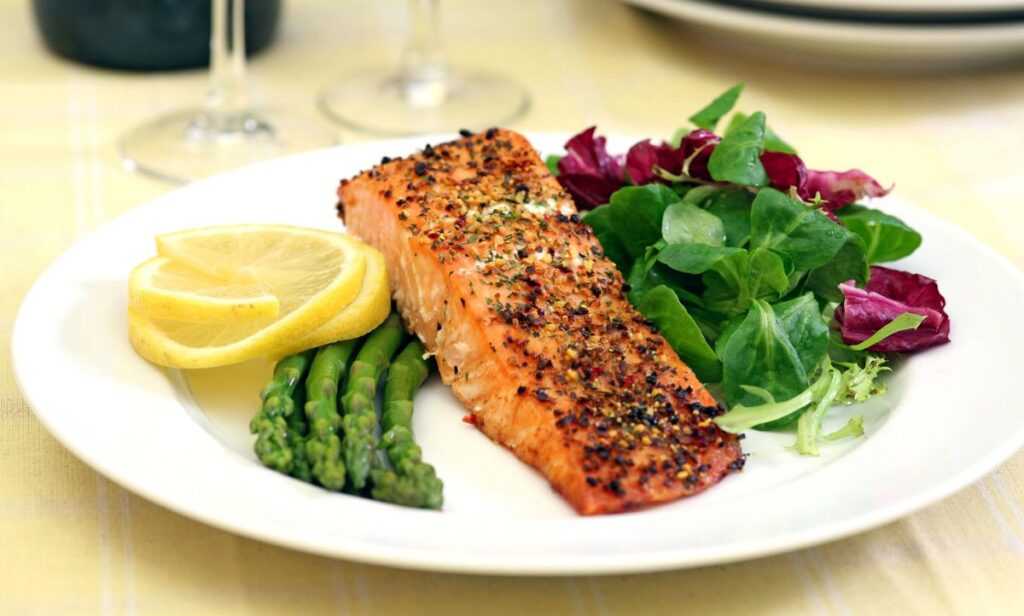
The higher your metabolism, the faster you burn calories. A sluggish metabolism will cause you to feel tired and eat more. The high protein intake and cycling of carbs in this diet boost metabolism.
As we create a calorie deficit or burn more calories to lose weight, our metabolism adapts and tries to conserve energy. You end up with a weight loss plateau as your weight stalls despite continuing the same diet.
To create metabolic confusion, you need to change your caloric intake. This is done by carb cycling or carb loading. Cycling your carb intake from 25% to about 35% of your total intake should be sufficient to boost your body’s metabolic rate as it has to work harder to adapt to the changes.
Eat low carb for a few days and switch to moderate levels for a day or two before switching back. This will prevent your metabolism from slowing down even as you continue to lose weight.
Unlike restrictive low-carb diets such as keto, the high protein low-carb diet gives you the flexibility to adjust your carb intake between low to moderate levels and even an occasional high-carb day when you do that extra intense workout. Carb loading also raises leptin levels. This maximizes fat loss without any deficits in energy levels or nutrient intake.
6. High protein intake for weight loss
High protein intake is also known to boost metabolism. It helps level out your blood sugars and protect your muscles from being burned for energy.
A protein-rich low-carb meal reduces the levels of the hunger hormone ghrelin while increasing satiety hormone levels (4). This leaves you feeling full and satisfied, curbing food cravings and overeating. This lowers your calorie intake resulting in more weight loss.
Protein has a high thermic effect on food (TEF) – about 20 to 30% (x). This means 30 protein calories are burned for digesting 100 protein calories, leaving you with just 70 calories. This makes a significant difference when trying to create a calorie deficit for weight loss. This high thermic effect of protein is one of the factors that contribute to its ability to boost metabolism (5).
But do keep in mind that excess protein in your diet gets converted to glucose and stops the fat burning (6).
Frequently Asked Questions (FAQS) on High Protein Low Carb Diet for Weight Loss
1. Are low-carb, high-protein diets the same as Keto?
Most popular low-carb diets such as the Ketogenic diet and Atkins are very low-carb, high-fat diets. They do not recommend high protein intake and often rely on high fat intake to promote ketone production. They are also much more restrictive and unsustainable in the long run.
In low-carb, high-protein diets, the emphasis is on boosting metabolism and reducing leptin resistance. It’s not about running your body on ketones.
2. What are the health benefits of high protein, low carb diets?
High protein, low carb diets have numerous health benefits that go beyond weight loss.
- Enhanced muscle mass: On this diet, your body composition changes as your muscles remain protected and you lose body fat. If you combine exercise with this diet program, it increases muscle mass and strength giving you a leaner and toned look (7).
- Improved blood sugar control: Blood sugar markers improve significantly with the combination of high-protein foods and reduced carb intake (8).
- Bone health: Protein-rich diets reduce bone loss and the risk of fractures (9).
- Heart health: Low-carb diets reduce cardiovascular risk factors (10). Even after achieving desired weight loss, blood pressure is better regulated when protein intake is increased and that of carbs is reduced (11).
3. What foods can I eat on a high protein low carb diet plan?
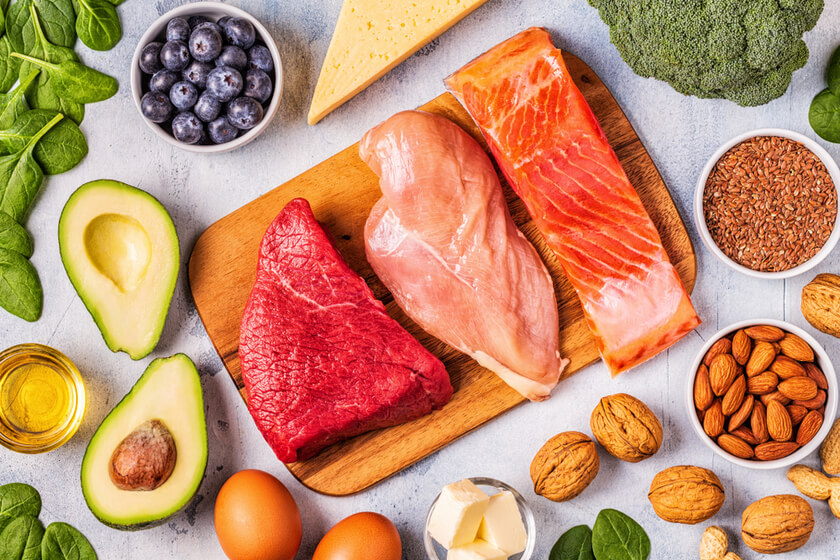
This is a versatile diet plan where you can eat wholesome nutrient-rich foods rich in protein, vitamins, minerals, fiber, and antioxidants.
- Have more protein-rich foods such as eggs, fish, poultry, dairy products such as cottage cheese and greek yogurt, as well as tofu and other soy foods.
- Snack on nuts such as walnuts and macadamia nuts, but go easy on the higher-carb ones such as cashews. Nut butters, especially peanut butter are a great addition.
- Add a variety of seeds to your salads and smoothies. Chia, flax, pumpkin, watermelon, and sunflower seeds are all healthy choices.
- You can eat plenty of non-starchy, fibrous vegetables such as cauliflower, broccoli, mushrooms, bell peppers, etc.
- High-protein grains such as quinoa, couscous, and millet can be taken in moderation.
- Olive oil, coconut oil, butter, etc. are healthy sources of fat.
Feel free to add spices and fresh herbs of your choice. Drink water, unsweetened herbal teas and coffees, lemon juice, and sparkling water to quench your thirst.
4. What foods to limit on a high protein low carb diet plan?
For quick and efficient weight loss, avoid sugar, highly refined grains, and sweetened beverages. Limit:
- Beverages such as beer, sports drinks, and soda are high in carbs.
- Sweeteners such as maple syrup, agave, and honey
- Grain-based foods such as cooked rice, bread, cereal, pasta, muffins, cookies, etc. are very high in carbs
- High-carb processed foods such as french fries, pizza, etc.
5. What are the risks of high-protein, low-carb diets?
If you don’t overdo the protein intake and go easy on the fats, a high-protein, low-carb diet is generally safe to follow. It’s important that you don’t cut your carbs or calories too drastically, especially for extended time periods.
- While high protein diets are good for you, too much for too long can have adverse effects, including increased heart risk (12).
- Those with kidney problems should also avoid high-protein diets as this can strain the kidneys further.
Conclusion
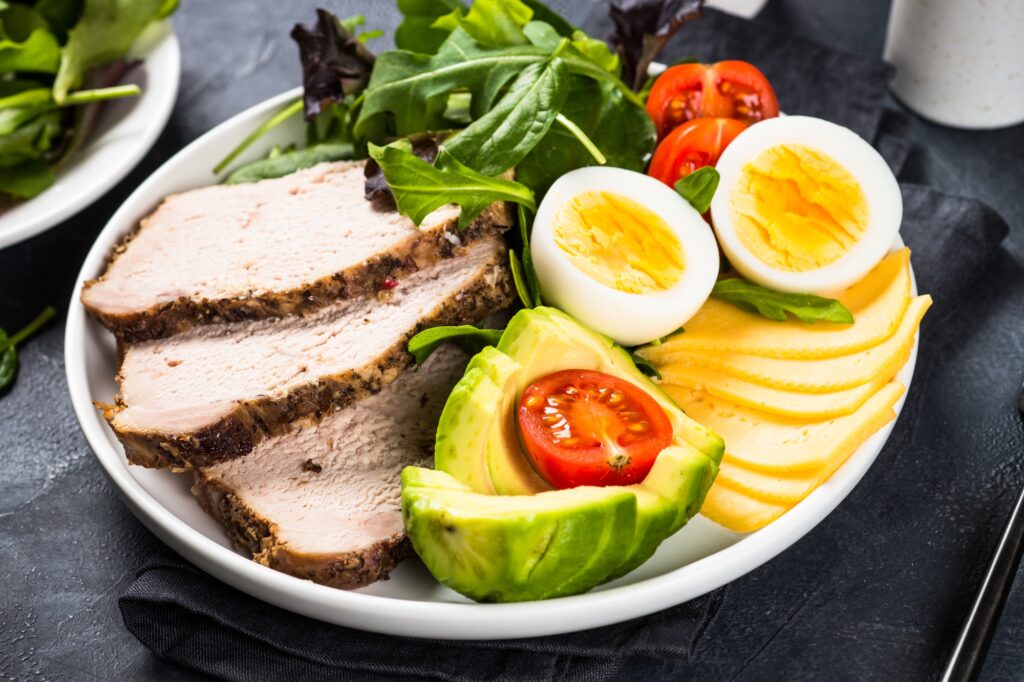
A high protein low carb diet is quite effective for those wanting to lose weight. But it is more suitable for those willing to do some workouts along with their diet. This increases muscle mass, metabolism, and calorie burning.
To ensure this diet is healthy and sustainable for the long term, you need to include wholesome, nutrient-dense foods such as whole grains and legumes. But adjust the quantities to stay within your planned carb intake. Include fibrous vegetables and leafy greens. Restrict the intake of refined grains and processed foods. Add small amounts of healthy fats, and plenty of protein-rich foods such as eggs, fish, nuts, etc.
The high protein low carb diet is easier to follow long term as the high protein intake satisfies hunger pangs, curbs the appetite, and even protects your muscle from breaking down during weight loss. There are no clear-cut rules for how much carbs or protein you need to take. So you need to decide for yourself the ratio of carbs and protein, based on your lifestyle and activity levels.
